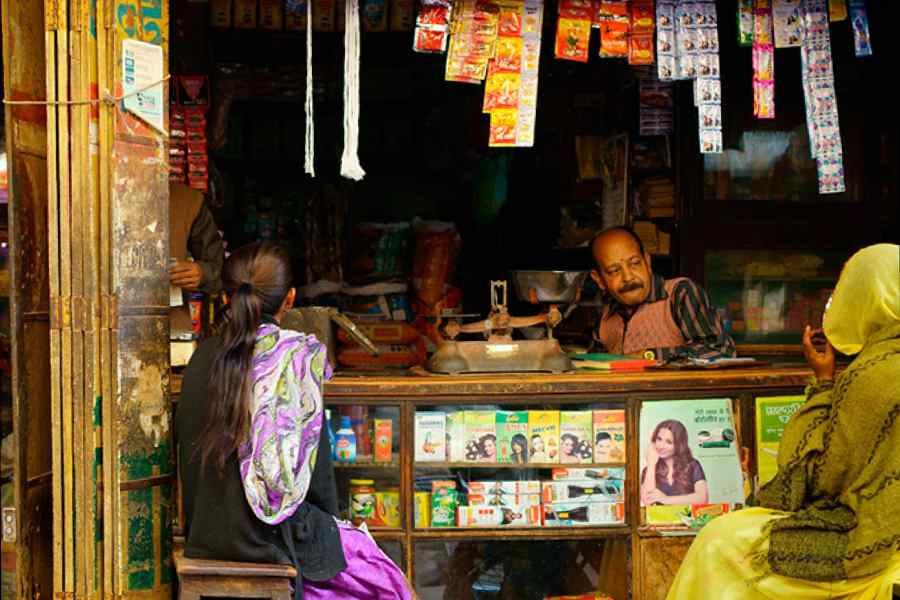The spontaneous tendency of capitalism is to encroach on the petty production sector, including peasant agriculture and small trade: agribusiness subjugates peasant agriculture, malls displace small shopkeepers, Amazon replaces the neighbourhood grocery shop, big manufacturing supplants artisans, all resulting in the impoverishment of petty producers. In an economy where more than half of the total output and close to 85% of total employment is provided by the ‘unorganized sector’, the operation of this spontaneous tendency of capitalism cannot be sustained within an electoral democracy based on universal adult suffrage.
This is why, for a long time, what prevailed in India was ‘controlled capitalism’ that protected the small producers against capitalist encroachment: farmers were insulated against domestic and foreign corporations; support and procurement prices sought to ensure a minimum profitability for them and protect them against world price fluctuations; a share of cloth output was reserved for the handloom sector; and artisans like the weavers of Benaras silk sarees were exempt from taxes. And political formations that championed unbridled capitalism, like the Swatantra Party, did not cut much ice electorally.
India never had an equivalent of the British Conservative Party or the continental Christian democratic parties which were openly pro-capitalist while still retaining electoral clout. Europe could have such parties because the bulk of the European peasants, petty producers and petty traders, who were the victims of unbridled capitalist development, could migrate to the temperate regions of settlement like Canada, the United States of America, Australia, New Zealand and South Africa; those who remained were just a fringe. Around 50 million persons migrated from Europe, especially Western Europe, to other temperate regions between 1815 and 1914, comprising more than a third of the population of Western Europe in 1815. In their new habitats, they subjugated local inhabitants and took over their lands, confining them to reservations. Such an avenue, of large-scale settler colonialism via displacement, apart from being abhorrent, is not available today to any developing country including India.
Neoliberalism, however, entails a removal of all restraints on unbridled capitalism, which raises the problem: how to have a political formation that champions the unbridled capitalism demanded by a neoliberal regime while, at the same time, remains capable of winning elections? The Congress under Manmohan Singh, it may be thought, had constituted such a political formation; but that is untrue. Manmohan Singh’s re-election in 2009, far from showing the manageability of this problem, proves just the opposite. His re-election was not because he had continued to champion unbridled capitalism but because he had been obliged to compromise on unbridled capitalism, under pressure from the Left and progressive forces, by acceding to the demand for a legal employment guarantee, the Mahatma Gandhi National Rural Employment Guarantee Act, and relieving the banks of peasants’ debt. True, a political formation committed to neoliberal capitalism may become electable for a while by promising a ‘trickle down’ from the enhanced growth it would effect; but even this possibility disappears when neoliberal capitalism enters a period of crisis, as has happened since the second decade of this century.
This is why neoliberalism for its sustenance needs the support of a neo-fascist political formation, which provides a diversionary discourse by fomenting hatred against some hapless minority group, and also divides its potential challengers; the corporate-Hindutva alliance that has been ruling in India expresses this phenomenon. Such an alliance however can achieve nothing in terms of improving the conditions of the working people. It can neither alleviate the crisis, which larger government expenditure financed by larger taxes on the rich or a larger fiscal deficit could, because globalised finance frowns on both, nor halt the assault on petty production that unrestrained capitalism necessarily unleashes. Even neo-fascism therefore cannot provide sustenance for long to neoliberalism. The revolt of petty production against neoliberalism resurfaces.
We have just seen such a resurfacing. Many factors no doubt have gone into the Bharatiya Janata Party’s loss of seats in the recent elections, but an important one has been the revolt of the petty producers, especially the farmers. In Uttar Pradesh, Haryana and Maharashtra, the losses suffered by the BJP were palpably because of farmers’ opposition to it: the government’s refusal to bring in a legislation on minimum support price, as demanded by farmers, alienated their support; the collapse of onion prices hurt it in Maharashtra; the dire straits to which artisans have been reduced took its toll in eastern UP; even the BJP’s loss in Ayodhya could not be unrelated to the destruction of shops and encroachments on livelihoods caused by the Ram temple construction.
This has an important implication. If neo-fascism is a necessary prop for neoliberalism in a country like ours practising electoral democracy, then overcoming neo-fascism requires going beyond neoliberalism itself. If those opposing neo-fascism, whenever they come to power, pursue the same neoliberal economic policies, then they would lose support in no time and bring the fascists back to office. The protection and promotion of petty production, including succour for farmers through support prices (which have been virtually abolished in cash crops and continue in foodgrains only because of farmers’ resistance), will be the first step against a neoliberal programme. Additionally, there must be provision of quality education, including in rural areas, through public institutions, and of universal healthcare through a National Health Service. The resources required will have to be raised through a combination of wealth tax and inheritance tax imposed on the super-rich who have benefitted immensely from neoliberalism. Since neoliberalism cannot survive in a society like ours without recourse to fascism, defeating the latter necessarily requires going beyond the former.
Prabhat Patnaik is Professor Emeritus, Centre for Economic Studies, Jawaharlal Nehru University, New Delhi










